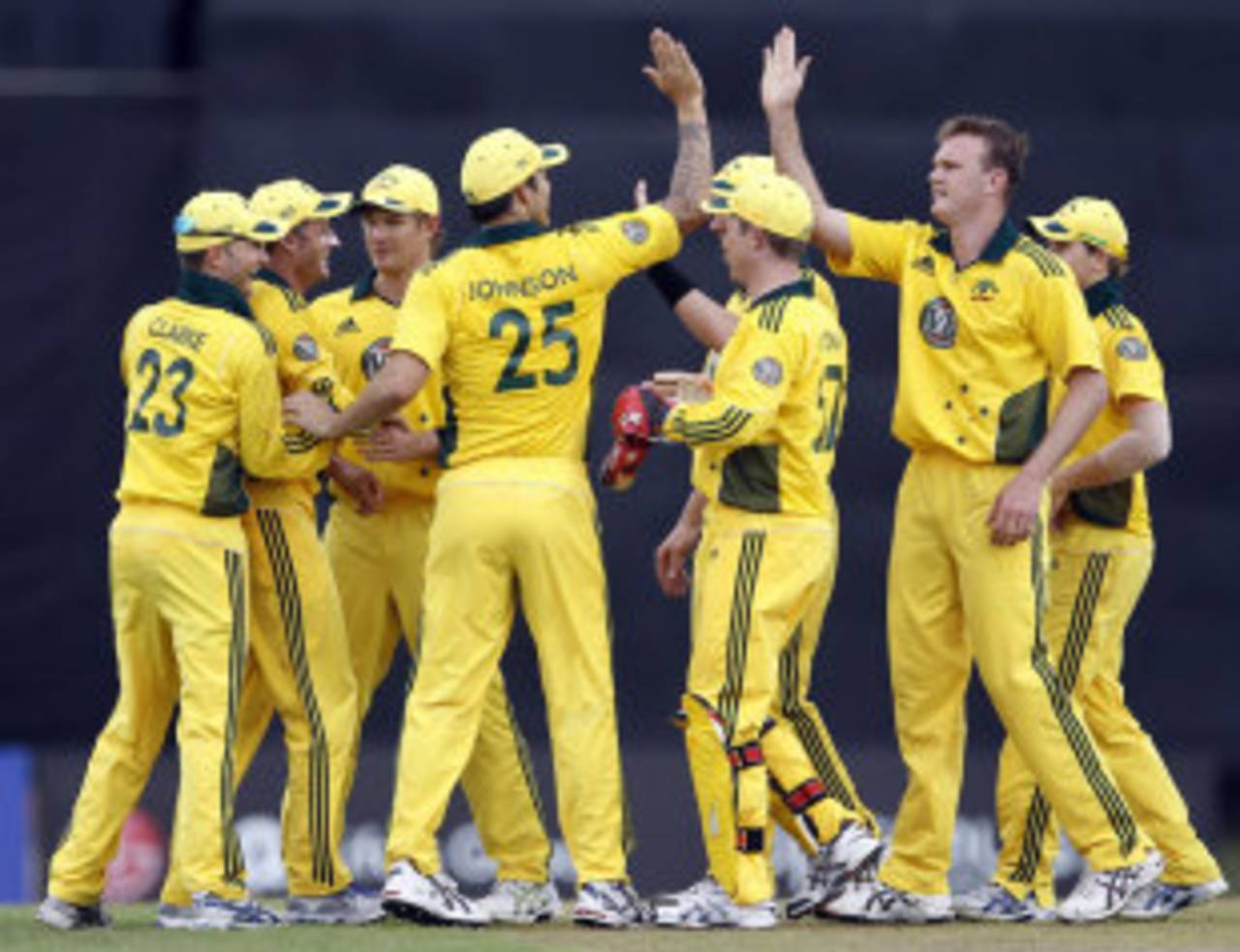Can't bat, can't bowl, can't field
The Don Argus report into Australian cricket documents in detail the areas of improvement for the national team - and a lot of them concern the basics of the game
Daniel Brettig
Aug 19, 2011, 9:50 AM

The Australian team needs to improve in all disciplines, according to Don Argus' report • Associated Press
Australia's cricket team has become a prized example of mismanagement, non-performance, inadequate succession planning, poor team culture, and a glaring lack of accountability. Its pathway from club cricket to the first-class arena has become muddled, beset by a wrongheaded incentive structure, a poor format and a similar waft of the unaccountable.
So says Don Argus' report into the sharply declining performance of the nation's cricketers and their support network, in a document every bit as ugly and confronting as the Ashes loss that hurried its commission. While the recommendations of the Argus review panel were dramatic and immediate, the detail of the report is so damning as to make them look reserved.
The most galling passages concern the reasons for the poor performance of the Australian team, and the failure of a seemingly bountiful, well-paid side and support staff to adequately address even the most basic of issues since a succession of retirements pushed the XI into a new phase.
Australia's captain Michael Clarke said on his entry to the leadership that Australia's basics had to improve. The review quantifies exactly how much, pointing out the national team had shown an inability to adhere to many of the most basics tenets of the game.
"The evidence from the Ashes and other recent series is that our basic cricket skills are lacking in key areas, in particular: For batting; batting for long periods; batting against the moving ball; our approach to playing spin; general batting technique in some instances," it read. "For bowling; building pressure; bowling to an agreed plan; spin bowling and captaincy of spin bowling; swing bowling, including generating reverse swing. For fielding; overall fielding, especially catching; General athleticism; this has extra significance as in the panel's view fielding standards reflect the attitude and professionalism of the team.
"For our overall approach; Building batting and bowling partnerships; General game sense/match awareness and cricket expertise, including the ability to problem-solve during the course of a match."
Ironically for a team that has had a baseball-based fielding coach for numerous years in Mike Young, the review suggested that greater measures of fielding needed to be taken for this aspect of the game served as both a reliable way to improve results but also a strong barometer for the team's wellness.
"For catching and fielding specifically, the panel recommends introducing explicit measurement of catching and fielding efficiency for all first-class and international players and teams," the review said. "These should also feed in to player rankings/performance incentives.
"One simple measure would be catches taken as a percentage of chances created. Chances could be weighted by difficulty if required. The same could be done for run-outs. Measures of this nature have been standard practice in baseball and other sports for decades and should become standard in Australian cricket."
In addition to the many problems of skill, the panel also highlighted inconsistencies in selection and the failure to consistently promote or demote players on the basis of performance. Simon Katich alluded to this problem during his furious response to being dropped from CA's list of contracted players, a decision that defied fairness and most logic.
"It is critical that superior performance is rewarded at all levels," the report said. "Players must earn their positions in the time-honoured way of making runs, taking wickets and showing that they are ready to play at the next level. At the same time, potential cannot be overlooked: there must be room for some intuition in selections. Players must be held accountable when they are not performing. This has been an issue in recent years."
For Clarke, the greatest problem he has been charged with confronting is the building of a much improved team culture, which promoted greater trust and leadership by example. As a way of measuring this, Clarke and his deputy Shane Watson will be pushed to foster more frank "adult conversations" while undergoing a process of mentoring themselves.
"Another theme to emerge from the interviews was the lack of a strong culture in the current Australian team," the review said. "There was also negative commentary about the broader culture in Australian cricket. The attitudes reported are quite different to those needed to be successful at elite level. Remedying these issues is clearly critical, and requires immediate and concerted effort.
"The team's leaders need to be made aware of the situation and their roles in creating it. A 360-degree feedback process is needed, followed by "adult conversations" with each individual spelling out how they are perceived and, where necessary, agreeing required changes to behaviour as part of an overall development plan (skills, physiology and psychology).
"Senior players including the captain and vice-captain should receive mentoring by an external professional at least every 6 months and at least for the first 2 years of their tenure. The captain should also actively seek and use the counsel of his vice-captain, which is an important role and should be more clearly defined.
Armed with this awareness, senior players and staff must lead by example. They must perform strongly on the field but also role model the desired behaviours and enlist the other opinion-shapers in the group to do the same. They must also increase the level of trust and honesty within the group."
The term "adult conversation" was used several times in the report, and again by Argus while discussing its release. The message was as clear as the report itself - time for the Australian cricket team to grow up.
Daniel Brettig is an assistant editor at ESPNcricinfo